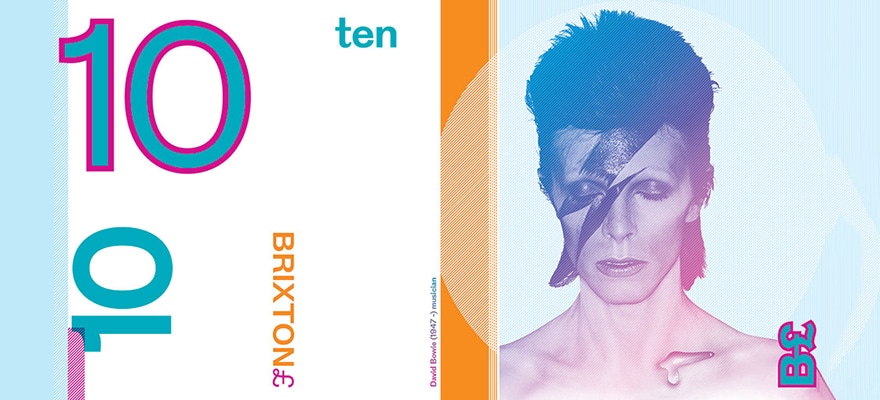One of the greatest musical artists in the world, David Bowie, has passed away at the age of 69 years old after a battle with cancer. While most of the stories you’ll read and watch today about the man will focus on his amazing music career, Bowie also had an impact on the world of finance - both as an icon and as a visionary.
BowieCoin
Around the same time that bitcoin was just getting started, an alternative currency was taking root in the British capital. The Brixton Pound (B£) is a local initiative in the southwest London neighborhood meant to support Brixton businesses and encourage local trade and production, which gained international fame recently. It was launched in September 2009 as a physical paper-based currency adorned with images of local superstar, David Bowie, who was born and raised in Brixton.
The artistic paper version was followed in September 2011 by the launch of the electronic B£ pay-by-text platform. According to the currency’s official website, around 250 businesses currently accept paper B£ and around 200 have pay-by-text accounts.
As Cryptocurrencies -focused professionals, the case of the Brixton Pound could tell us two major things about the prospects for their success. First, it shows that there is pent up demand for alternative currencies, those not printed by central banks, even in the heart of the British financial empire - whose currency has been one of the most accepted worldwide for centuries.
Second, it shows that not all people are willing to see money as just numbers on a computer in the cloud. Unlike gold diehards that believe the metal has intrinsic value, the people of Brixton are willing to accept a paper that was not printed by the Bank of England – but it is still mainly a physical storage of value and a trade facilitator.
It is likely that people who choose a local alternative currency covered with images important to the community, such as B£ and others around the world, see it as an act of protest against the established financial order. However, it is not a given that they will support or trust (or understand) how a distributed Blockchain works.
Evangelists of cryptocurrencies need to figure out how to reach ordinary people the world over, without the ability to put a physical object they can hold in their hands and see the face of their beloved local hero.
BowieBond
An older example of the impact David Bowie had on finance is a venture he took on himself. Years before artists started asking for funding on Indiegogo or the term crowd financing become a buzzword, Bowie was already thinking in a way that even today would be considered quite revolutionary for a star of his caliber.
In 1997 Bowie securitized his future income by issuing bonds for $55 million, carrying a hefty 7.9% interest rate over 10 years backed by income from his established records. With this move the artist made funding and musical history, as the first ever to do so, and maybe gave us all a glimpse of the type of creative thinking all industries need.
Even the unfortunate fact that the bonds were downgraded to junk status by Moody's in 2004 when the entire music industry had its old models disrupted by the internet, file sharing, and MP3s cannot take this achievement away from Bowie.
[embed width="420" height="315"]https://www.youtube.com/watch?v=HyMm4rJemtI[/embed]


















